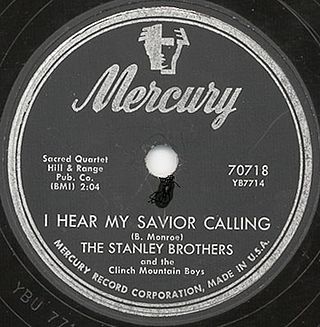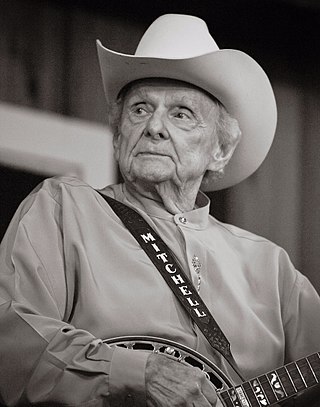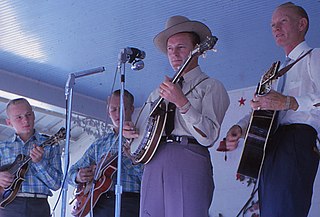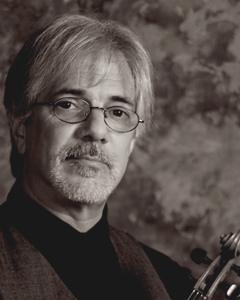
The Stanley Brothers were an American bluegrass duo of singer-songwriters and musicians, made up of brothers Carter Stanley and Ralph Stanley. Ralph and Carter performed as The Stanley Brothers with their band, The Clinch Mountain Boys, from 1946 to 1966. Ralph kept the band name when he continued as a solo artist after Carter's death, from 1967 until his own death in 2016. Thomas Goldsmith: This article continues to state that “many years later,” Ralph started playing again after Carter’s death. This is not just wrong, but absurdly wrong. As seen in many accounts of Ralph’s career, he essentially never stopped performing after Carter’s death. He played some remaining Stanley Brothers dates, then moved forward with the Clinch Mountain Boys, performing until not long before his own death.

Ralph Edmund Stanley was an American bluegrass artist, known for his distinctive singing and banjo playing. He began playing music in 1946, originally with his older brother Carter Stanley as part of The Stanley Brothers, and most often as the leader of his band, The Clinch Mountain Boys. Ralph was also known as Dr. Ralph Stanley.
Norman L. Blake is a traditional American stringed instrument artist and songwriter. He is half of the eponymous Norman & Nancy Blake band with his wife, Nancy Blake.
Benny Edward Martin, was an American bluegrass fiddler who invented the eight-string fiddle. Throughout his musical career he performed with artists such as the Bluegrass Boys, Don Reno, the Smoky Mountain Boys and Flatt and Scruggs, and later performed and recorded with the Stanley Brothers, Hylo Brown, Jimmy Martin, Johnnie and Jack, and the Stonemans, among others. He was inducted into the International Bluegrass Music Hall of Fame in 2005.
Anthony Cattell Trischka is an American five-string banjo player. Sandra Brennan wrote of him in 2021: "One of the most influential modern banjoists, both in several forms of bluegrass music and occasionally in jazz and avant-garde, Tony Trischka has inspired a whole generation of progressive bluegrass musicians."

Donald Wesley Reno was an American bluegrass and country musician, best known as a pioneering banjo and guitar player who partnered with Red Smiley, and later with guitarist Bill Harrell.
Traditional bluegrass, as the name implies, emphasizes the traditional elements of bluegrass music, and stands in contrast to progressive bluegrass. Traditional bluegrass musicians play folk songs, tunes with simple traditional chord progressions, and on acoustic instruments of a type that were played by bluegrass pioneer Bill Monroe and his Blue Grass Boys band in the late 1940s. Traditional bands may use their instruments in slightly different ways, for example by using multiple guitars or fiddles in a band.

Beecher Ray "Pete" Kirby, better known as Bashful Brother Oswald, was an American country musician who popularized the use of the resonator guitar and Dobro. He played with Roy Acuff's Smoky Mountain Boys and was a member of the Grand Ole Opry.

William Bradford "Bill" Keith was a five-string banjoist who made a significant contribution to the stylistic development of the instrument. In the 1960s he introduced a variation on the popular "Scruggs style" of banjo playing which would soon become known as melodic style, or "Keith style". He was inducted into the International Bluegrass Music Hall of Fame in 2015.

Alan Munde is an American five-string banjo player and bluegrass musician. He was inducted into the International Bluegrass Music Hall of Fame in 2024.
DeWitt "Snuffy" Jenkins was an American old time banjo player and an early proponent of the three-finger banjo style.

Russ Barenberg is an American bluegrass musician.

Kenny Kosek, is an American fiddler who plays bluegrass, country, klezmer, folk music and roots music. In addition to his solo career, he has performed with many other well-known performers and contributed to film and television soundtrack music. He is also a musical educator. He is a graduate of the Bronx High School of Science and City College of New York.
Joseph Calvin "Butch" Robins is an American five-string–banjo player with his own, distinct style. He's an individualist and, according to himself, "a seeker of information, knowledge and wisdom."
Allen Shelton was an American five-string banjo player mostly known for being a member of the bluegrass band Jim & Jesse and the Virginia Boys since the 1960s. Shelton was born in Rockingham County, North Carolina, on July 2, 1936. Shelton started playing the banjo when he was fourteen. His father Troy Shelton was a guitar player mainly, but also played mandolin and banjo. A local musician named Junior Biggs showed him some three-finger style rolls.

Doug Dillard is an American bluegrass banjo player. In addition to his solo albums and recordings with the Dillards and Dillard & Clark, he has been featured as a performer and composer on numerous albums by other artists.
David Grier is an American guitarist. In addition to his solo albums and recordings with Psychograss, Richard Greene and The Grass Is Greener, and with Todd Phillips and Matt Flinner, he has been featured as a performer on many albums by other artists.
Dudley Dale Connell is an American singer in the bluegrass tradition. He is best known for his work with the Johnson Mountain Boys, Longview, and The Seldom Scene.
"Freight Train Blues" is an early American hillbilly-style country music song written by John Lair. He wrote it for Red Foley, who recorded the song with the title "I Got the Freight Train Blues" in 1934. The tune was subsequently recorded by several musicians, with popular renditions by Roy Acuff in 1936 and 1947. Bob Dylan later adapted it for his self-titled debut album (1962).








